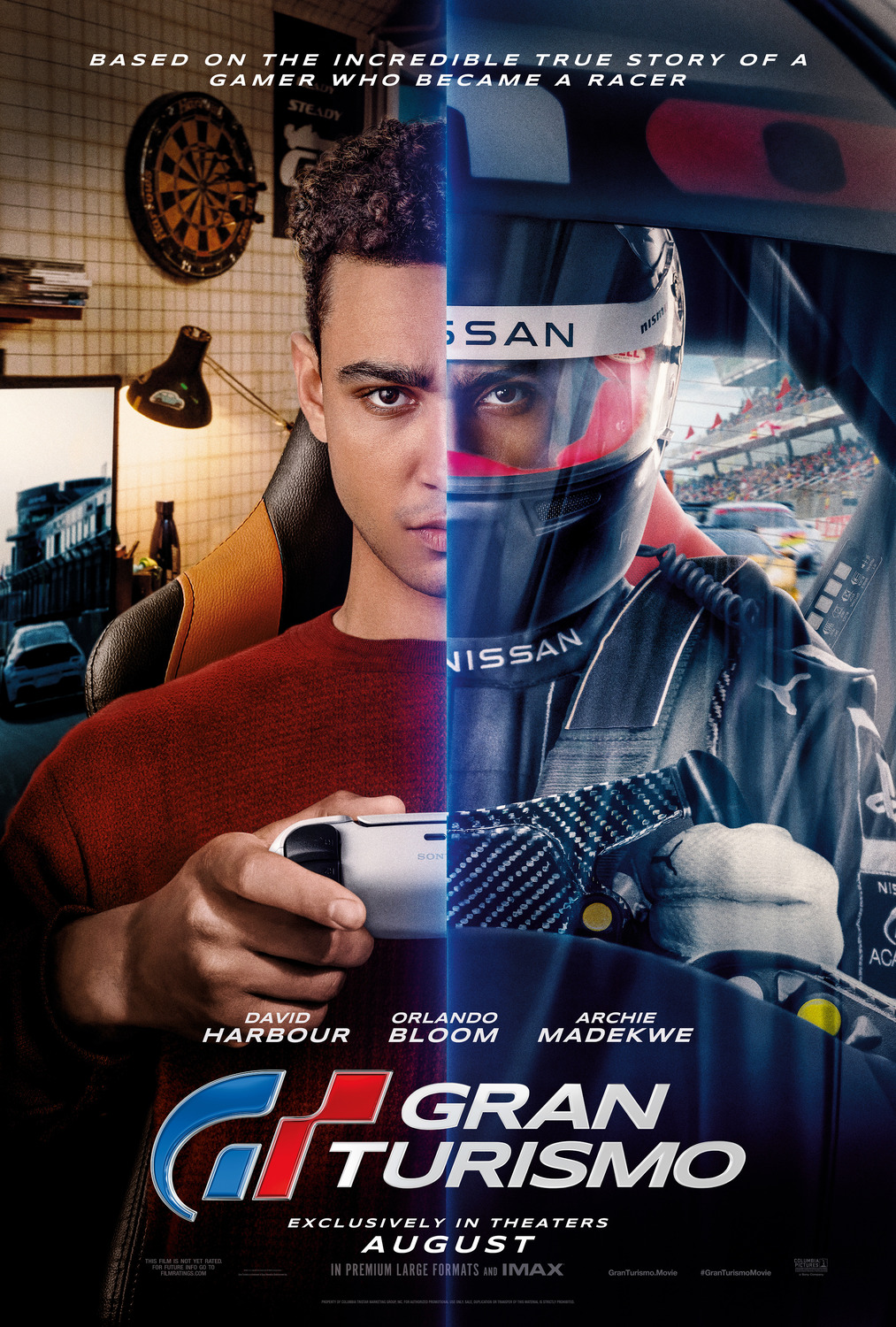Director
Neill Blomkamp
Starring
Archie Madekwe
David Harbour
Orlando Bloom
Djimon Hounsou
The story kicks off as we initially follow Danny Moore [Bloom], a Nissan marketing executive who has a radical proposal: to tap into the tens of millions of Gran Turismo video game players by launching an academy where they can prove themselves on a real race course. Part publicity stunt, part demographic tapping, the bold suggestion works. But no engineer wants to head the project. That is, until Danny approaches cantankerous former driver, Jack Salter [Harbour]. From here we follow Jann Mardenborough [Madekwe], a highly skilled racing sim driver who yearns to escape his mundane life – and this newly announced GT Academy seems like the perfect opportunity.
Up until the last few years, video game adaptations have rarely experienced anything more than embarrassment and rejection from both fans, critics and filmgoers. This usually stems from a disconnect between the mediums, a dismissal of the source material, and a failure to properly translate the story from console to screen. That said, Gran Turismo is a racing simulator, it doesn’t really have a story. So focusing on the real-life tale of gamers given the chance to put their digital skills to the test in a real-world scenario is a much stronger foundation for a compelling movie narrative. In fact, if you look at titles like The Mighty Ducks, Warrior, Invincible, Rocky and even A Knight’s Tale, they all take amateurs and enthusiasts and throw them in the professional deep-end. It’s a tried and tested formula for success. And with an impressive cast, practical visuals and a signature director, Gran Turismo should be a licence to print box office revenue and rave reviews. Except it’s not. It’s somehow actually terrible.
Outside of the central casting of Madekwe and Harbour, the supporting elements come off as bizarre. Orlando Bloom, for example, is clearly the corporate stooge. He’s the catalyst for this program but not entirely in it for altruistic reasons. And as such Bloom plays the character like a moustache-twirling villain in a schlocky action b-movie. It’s not that this is the wrong choice but it’s certainly not a consistent one; most notably because Moore may be self-serving but he isn’t an active antagonist. This means Bloom’s delivery often sounds forced, especially when up against the grounded emotional anchor that is David Harbour’s character. But that’s nothing compared to one of the most distracting casting choices: Geri Halliwell Horner as Jann’s mother. One could argue her casting makes sense considering her racing driver husband, except it doesn’t because that shouldn’t be a prerequisite for the role. Granted, she neither elevates nor sinks the film but it’s an odd choice regardless. Djimon Hounsou, on the other hand, does the best he can with the minimal screen-time he is afforded. And although his arc as Jann’s father is incredibly rote, Hounsou impressively delivers.
Speaking of rote, this script is truly shocking. Every single interaction feels like an archaic throwback to hideously dated and threadbare cliches and tropes. The conflicts, the exchanges, the speeches, every one of them predictable and pedestrian. We have the “you’ll never get me on a bicycle” smash-cut gag, adversaries aggressively eating apples, a hard-nosed mentor who missed his own shot and is trying to protect his protege, and the Westerner overwhelmed by the bright lights of Tokyo. It’s all here and all so crushingly generic.
And if the formulaic presentation wasn’t bad enough, this film expects you to care, rather than actually working to elicit an emotional response. Case in point, Jann gets into some classic early twenties hijinks and almost loses the opportunity to enter the initial qualifying race. Thankfully he manages to get there just in time and wins by a hair’s breadth, securing him a place in the GT Academy. This moment signifies his life-raft. The chance to prove himself and escape his humdrum, seemingly dead-end, life. But the entire sequence is over within minutes and grates thanks to the insipid commentary from his friend. Lots of “he’s coming up on you,” “you’ve gotta punch it,” “go go go, you’re in fourth place,” and other arbitrary tautologies. Only for the race to conclude and the victory played up in a way that indicates the audience should be celebrating. But while the stakes may be high, there’s no sense of genuine jeopardy. And this predetermined plot advancement is quickly supplanted by the next hollow scene. Nothing is truly earned, the film simply marches out tired conventions and assumes you’ll be invested.
In truth, sometimes a crummy script in a film of this nature can be semi-counterbalanced with thrilling action sequences. Regrettably most of these are too erratically edited and rushed. And when it comes to the racing itself, yes there are some fairly creative HUD visuals that try to convey what’s happening, but for the most part, nothing is cleverly explained to the audience in advance. Meaning each race is hastily scrambled through with clumsy expository dialogue, often taking the form of throwaway punch-up lines. A prime example of this takes place during one of the crucial qualifying races. For the first lap, the drivers don’t go full-pelt, they have to warm up the tires by swerving, to better grip the turns when tackling them at high speeds. This is racing 101 but while the audience may not know this, there’s no reason for an engineer to be explaining this to a driver as it’s happening. Yes, it’s a pitfall for all sports films but there are so many inventive ways of embedding these details in your narrative, outside of bluntly telling the audience.
The film, however, isn’t a complete write-off. The message of an underdog proving themselves to not only their family but to the wealthy elite who occupy the top spots, is a powerful one and is thankfully consistent throughout. On top of that, Gran Turismo also handles the central question of “can simulated skills translate to the real world?” with decent finesse. It has the difficult task of talking to gamers, race fans, and the self-glorifying coverage of the very real GT Academy venture that ran from 2008 to 2016. I will also commend the movie for the amount of real cars and in-camera recording which adds a distinct weight and gravitas to the proceedings. And finally, utilising Lorne Balfe, who has one foot in film scoring and the other in game scoring, is a great choice.
The truth is, this movie is somehow simultaneously too long and massively under developed; begging the question, what have they done for the entire runtime? Hounded by unsteady pacing and a narrative shift midway through, meaning there’s really only one race that seems to work as intended; solely because it’s given the necessary time to breathe. It’s also utterly staggering that this is a Blomkamp-helmed movie, as it’s devoid of his directorial flair and presence. And while there are a handful of standout shots and concepts, they’re not enough to save the film or counter the rest of the banality on display.
Release Date:
11 August 2023
The Scene To Look Out For:
Without spoiling the scene, the crash at Nürburgring is legitimately stunning in its execution. Ominously foreshadowed, beautifully shot, intense and culminating in a truly shocking outcome. It’s just a shame the rest of the film can’t maintain that pace, as all that emotional momentum is watered-down for the remainder of the movie and you’re left questioning where this passion was during the film’s opening half.
Notable Characters:
Both Madekwe and Harbour pour a commendable amount of soul into their painfully plain characters. The pair have decent chemistry and offer up enough heart and sincerity to carry you to the end of the film.
Highlighted Quote:
“No one is going to welcome you into this world. The other drivers, your pit crew, no one wants you here.”
In A Few Words:
“A shallow, missed opportunity that only offers a glimpse of what could have been in the final third.”
Total Score: 2/5

![The Red Right Hand Movie Reviews [Matthew Stogdon]](https://reviews.theredrighthand.co.uk/wp-content/uploads/2021/12/cropped-header1.png)



